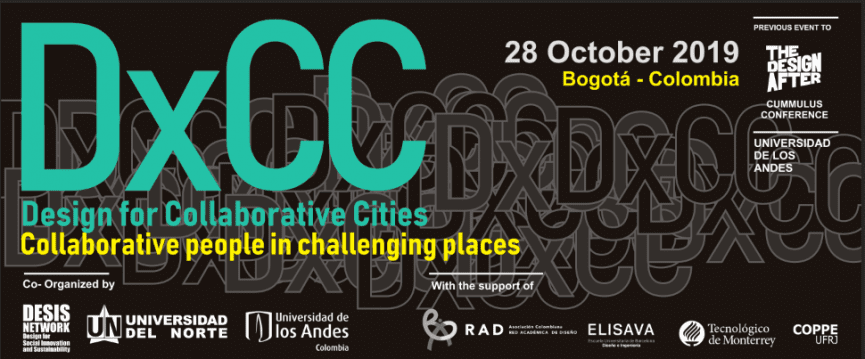These are some thoughts that arose from a request by Prof Ezio Manzini for me to provide some prior input into the DESIS DxCC Seminar on Collaborative People in Challenging Places which took place at the Cumulus Bogotà Conference on the 19 September 2019:
“Much of my research engages with individuals who were previously legally marginalised under apartheid, and now even with a majority elected democratic government in place for the last 21 years, continue to find themselves on South Africa’s margins, both physically and politically. Cities in Africa, and South Africa in particular, hold the hope for a better future and hence have been the locations for extensive urban migration. The Gauteng-City Region, where I am based, is home to a quarter of South Africa’s total population. It generates a third of the country’s GDP, on just 2% of South Africa’s total land area. However, such economic stats only speak to those who are formally employed, which in the entire country, is less than 20%. This means a staggering 80% of South Africans eke out an existence in some form or other in the informal economy. The South African government as an institution is bloated and inefficient, it is also in a rather precarious position with a tax base of only 1% of the population paying a third of the government’s revenue. Unlike countries like Kenya, which attempt to support their informal economy, the South African government’s strategy seems to be one of formalising the informal, and hence provides limited appropriate support for grassroots development. With a lack of state leadership in the informal economy, powerful role players organically control the informal sector through real or potential violence. An environment such as this is a petri dish for factionalism, racism, tribalism and xenophobia; not the rainbow nation envisioned by ex-president Nelson Mandela.
So what does all this have to do with Collaborative People in Challenging Places?
Living in South African cities, as described above, forces people to be creative – inherent human ingenuity is used to find and explore niches of opportunity. These grassroots activities by lay designers make use of scant local resources and are therefore sustainable by necessity. However one should not too easily celebrate the informal, since much of this creativity is driven by a consuming sense of insecurity, with many women and children living in extremely vulnerable situations. I have found in a significant amount of the work I do, that this leads to an almost instinctive return to individual self-preservation. Embedded in a Capitalist economic environment, in South Africa greatly influenced by American consumerism, such individualism becomes amplified.
This does not mean that collaboration does not take place, but that most collaboration has to have clear benefit for the individual in order for one to invest their most precious resource, time. Hence when opportunities for betterment can be attained through a collaborative endeavour, connections are formed, but these are not necessarily driven through a real desire for connection. In fact, many collaborative environments are fraught with distrust, with individuals constantly self-reflecting on what they are getting out, versus what they perceive others to be receiving. An example of this from my own research can be found in small-scale agricultural cooperatives.
Due to the South African government’s focus on formalising business, it only provides startup grants for agriculture to formally registered cooperatives. This in itself is an arduous process, requiring much administration that most small-scale farmers are not sufficiently educated or interested in undertaking. If finally registered, many of the cooperatives are made up of ‘ghost’ members to meet formal membership requirements with possibly only one active farmer in the whole entity. If funding is received it is shared with all members, but the cooperative organisation is left with the difficult task of making a success of urban farming with only one active member. In most cases, the majority of income/funding then has to be directed towards the employment of labour. Furthermore, if there is more than one farmer in the cooperative, it is not uncommon that individual needs will supersede the need to maintain the organisation, with farmers taking money directly for selling produce and not declaring it back to other members or the cooperative itself. Such observations seem to negate the African philosophy of Ubuntu, which is used to describe a way of being that positively supports others. However, at the same time as witnessing seemingly ‘selfish’ acts, I have also seen farmers freely giving their produce to those in need in their community. It is also clear through the relationships I have forged with urban farmers, that the betterment of their direct family is one of the major motivational drivers for their efforts.
In short, collaboration in challenging places such as South Africa, is fraught with complexity. Designers engaged in promoting such collaborative action, require a deep connection with those they are working with, together with an empathic and psychological viewpoint from which to understand collaborative or seemingly anti-collaborative behaviour.”
